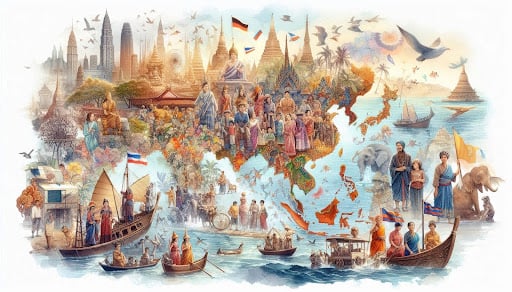SINGAPORE — As Asia rises in global influence, the region’s honorary consuls are increasingly at the forefront of diplomacy, trade, and cultural exchange. Appointed by foreign governments but deeply rooted in their host countries, these individuals occupy unique positions that blend public service with private credibility. The Vienna Convention on Consular Relations of 1963 provides the international legal baseline, but the actual practices of appointment and recognition vary across Asia.
This investigative press release examines the appointment practices of honorary consuls in three pivotal countries: Singapore, India, and Thailand. Each nation reflects a different balance of tradition, regulation, and pragmatism. By examining their processes, functions, and challenges, and drawing on case studies, we shed light on how honorary consuls influence diplomacy in some of Asia’s most dynamic states.
Singapore: Efficiency and Regulatory Precision
Singapore, renowned for its efficiency and legal rigor, applies the same standards to honorary consular appointments. The Ministry of Foreign Affairs (MFA) in Singapore maintains tight oversight. Foreign governments nominate candidates, but the MFA requires comprehensive vetting, including financial disclosures, criminal background checks, and security clearances.
Singapore emphasizes professional competence and community standing. Candidates are often senior business leaders, academics, or cultural figures with proven international networks. Once nominated, the MFA reviews whether the candidate aligns with Singapore’s diplomatic priorities and security standards. If approved, the government issues an exequatur, formally recognizing the appointment.
The privileges of honorary consuls in Singapore are modest. They may use consular emblems and enjoy protection for official acts, but they are subject to domestic law in their personal capacity. The emphasis is on functional service, not symbolic status.
Case Study: Trade Facilitation in Singapore
An honorary consul representing a European country in Singapore has played a crucial role in facilitating technology start-ups between the two nations. By leveraging Singapore’s role as a financial and innovation hub, the consul created venture capital pipelines that accelerated bilateral trade and investment. This practical contribution illustrates how Singapore’s tightly vetted consuls add value in high-stakes economic sectors.
Case Study: Crisis Management During the Global Financial Turmoil
During the 2008 global financial crisis, an honorary consul representing a Latin American state in Singapore coordinated emergency consultations for citizens who faced sudden job losses in the banking sector. The consul’s intervention with local legal advisors and social agencies underscored the value of honorary consuls as crisis managers.
India: Tradition Meets Diversity
India’s honorary consular system reflects its vast size, diversity, and history of global engagement. The Ministry of External Affairs (MEA) oversees appointments, but the regional context plays a significant role in these decisions. India hosts an extensive network of honorary consuls, particularly in port cities and commercial hubs such as Mumbai, Kolkata, and Chennai.
The process begins with nomination by a foreign government. The MEA conducts background checks in cooperation with local authorities, including state police and intelligence agencies. Key considerations include professional reputation, financial stability, and absence of political conflicts. Because India is home to vast diaspora communities, honorary consuls often emerge from within these groups, providing cultural fluency and community trust.
Privileges are functional rather than extensive. Honorary consuls can assist in citizen services and trade promotion, but do not enjoy complete diplomatic immunity. They are expected to fund their offices and staff independently, underscoring the requirement of financial self-sufficiency.
Case Study: Maritime Diplomacy in Chennai
In Chennai, an honorary consul representing an East Asian nation has played a pivotal role in facilitating shipping agreements. By connecting Indian port authorities with foreign maritime firms, the consul ensured smoother trade flows across the Bay of Bengal. This reflects how India’s consuls, often embedded in commercial hubs, contribute directly to regional economic integration.
Case Study: Diaspora Engagement in Kolkata
Kolkata, with its strong cultural heritage, hosts an honorary consul representing a European nation that has long-standing ties with Bengal. The consul organizes cultural festivals, supports student exchange programs, and assists diaspora communities navigating bureaucratic systems. Here, the consul’s role demonstrates how tradition and community engagement shape India’s honorary consular practices.
Case Study: Health Diplomacy in Bengaluru
In Bengaluru, a city renowned for its medical tourism, an honorary consul representing a Middle Eastern nation facilitated partnerships between Indian hospitals and foreign health ministries. These initiatives not only facilitated patient transfers but also promoted knowledge-sharing in advanced medical technologies.
Thailand: Flexibility and Cultural Integration
Thailand’s honorary consular system strikes a balance between formality and cultural adaptability. The Ministry of Foreign Affairs in Bangkok administers appointments, requiring nominations from foreign states to undergo review by both central authorities and regional offices.
Thailand’s approach reflects its history as a diplomatic hub in Southeast Asia. Candidates are often business leaders or cultural figures with established relationships in tourism, trade, or education. Because Thailand emphasizes personal connections and cultural integration, candidates with a deep understanding of Thai traditions are favored.
Privileges for honorary consuls in Thailand include use of consular emblems, protection for official acts, and access to limited exemptions on consular materials. However, as in Singapore and India, consuls remain under domestic law in their personal capacity.
Case Study: Tourism Promotion in Chiang Mai
In Chiang Mai, an honorary consul representing a Western country collaborated with local tourism boards to attract high-value travelers. By promoting cultural heritage tours and eco-tourism, the consul helped diversify Thailand’s tourism market. This demonstrates how honorary consuls adapt their functions to local economic strengths.

Case Study: Crisis Assistance in Bangkok
During political protests in Bangkok, an honorary consul representing a neighboring state coordinated safe passage for stranded nationals. The consul’s swift action, supported by local connections, underscored the practical value of honorary consuls in times of crisis.
Case Study: Academic Exchange in Khon Kaen
An honorary consul representing a European country established university partnerships in Khon Kaen, a region far from Bangkok’s diplomatic core. These partnerships promoted agricultural research and rural development, reflecting Thailand’s emphasis on local integration.
Historical Evolution Across Asia
The consular traditions in Singapore, India, and Thailand reflect broader historical contexts. Singapore’s efficiency stems from its post-independence emphasis on governance and regulatory clarity. Colonial legacies and diaspora engagement shape India’s expansive network. Thailand’s flexible model reflects its history as a never-colonized state that balanced diplomacy with cultural sovereignty.
Together, these traditions demonstrate how historical experiences shape modern appointment practices.
Comparative Insights
While united by the Vienna Convention framework, Singapore, India, and Thailand represent three distinct models:
- Singapore emphasizes efficiency, regulatory rigor, and professional competence.
- India blends formal oversight with cultural diversity and diaspora engagement.
- Thailand highlights flexibility, personal networks, and cultural integration.
Compared to European models, Asian systems tend to place greater emphasis on community integration and adaptability. While Germany prioritizes financial independence and France enforces strict codes of conduct, Asia’s systems are more attuned to cultural fluency and local legitimacy.
Challenges and Critiques
Each model faces challenges. In Singapore, critics argue that the strict vetting may limit diversity and exclude community figures who lack elite credentials. In India, accusations of favoritism and inconsistency occasionally arise, reflecting the influence of political and social networks. In Thailand, the flexibility that enables cultural integration also raises concerns about a lack of transparency and oversight.
Another shared challenge is public awareness. Citizens in all three countries often confuse honorary consuls with career diplomats, expecting services such as visa issuance that honorary consuls are not authorized to provide. This gap in understanding risks undermines the credibility of both honorary consuls and career diplomats.
Future Directions
As Asia’s global role expands, the function of honorary consuls is likely to grow. Proposals include:
- Standardized training: Equipping consuls with uniform knowledge of legal and diplomatic expectations.
- Transparency reforms: Publishing criteria and appointment processes to enhance accountability.
- Diversity initiatives: Encouraging inclusion of younger professionals, women, and underrepresented groups.
- Regional cooperation: Leveraging consular networks to support ASEAN initiatives, such as disaster response or educational mobility.
These reforms would not only improve national systems but also create opportunities for greater regional integration.
Practical Guidance for Aspiring Consuls
For professionals in Asia considering the role, key lessons include:
- Community credibility is crucial: Strong networks and reputations matter more than titles.
- Financial independence is required: The role is unpaid and demands personal investment.
- Cultural fluency enhances effectiveness: Understanding local traditions builds trust.
- Adaptability is key: Honorary consuls must balance ceremonial functions with crisis management and trade facilitation.
- Strategic vision adds value: Candidates who align their consular focus with national or regional development priorities stand out.
Conclusion
Honorary consuls in Singapore, India, and Thailand embody three different approaches to consular representation. While processes and privileges vary, the core principle remains the same: leveraging local credibility to extend diplomatic presence. In Asia’s rapidly shifting landscape, these honorary consuls provide cost-effective, culturally attuned, and community-rooted bridges between nations.
By understanding these appointment practices, their histories, structures, and challenges, foreign governments, businesses, and individuals gain strategic insight into one of Asia’s most flexible and effective diplomatic mechanisms.
Contact Information
Phone: +1 (604) 200-5402
Signal: 604-353-4942
Telegram: 604-353-4942
Email: info@amicusint.ca
Website: www.amicusint.ca



